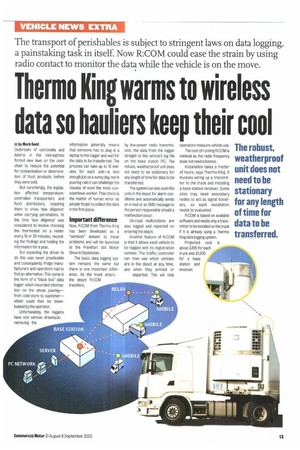Thermo King warms to wireless data so hauliers keep their cool
Page 15

If you've noticed an error in this article please click here to report it so we can fix it.
• by Mark Dodd Outbreaks of salmonella and listeria in the mid-eighties forced new laws on the coolchain to reduce the potential for contamination or deterioration of food products before they were sold.
Not surprisingly, the legislation affected temperaturecontrolled transporters and food distributors, requiring them to show 'due diligence' when carrying perishables. At the time 'due diligence' was considered to involve checking the thermostat on a reefer every 15 or 20 minutes, recording the findings and holding the information for a year.
But expecting the driver to do this was never practicable and consequently fridge manufacturers and operators had to find an alternative. This came in the form of a "black box" data logger which recorded information on the whole journey— from cold-store to customer— which could then be downloaded by the operator.
Unfortunately, the loggers have one serious drawback: retrieving the
information generally means that someone has to plug in a laptop to the logger and wait for the data to be transferred. The process can take up to 15 minutes for each unit—a nice enough job on a sunny day, but in pouring rain it can challenge the resolve of even the most conscientious worker. Then there is the matter of human error as people forget to collect the data in the first place.
Important difference
Now, R:COM from Thermo King has been developed as a "wireless" answer to these problems and will be launched at the Frankfurt IAA Motor Show in September.
The basic data logging system remains the same but there is one important difference. As the truck enters the depot R:COM transfers, by low-power radio transmission, the data from the logger straight to the vehicle's log file on the base station PC. The robust, weatherproof unit does not need to be stationary for any length of time for data to be transferred.
The system can also scan the units in the depot for alarm conditions and automatically sends an e-mail or an SMS message to the person responsible should a malfunction occur.
On-road malfunctions are also logged and reported on entering the depot.
Another feature of R:COM is that it allows each vehicle to be tagged with its registration number, The traffic controller can then see which vehicles are in the depot at any time, and when they arrived or departed. This will help operators measure vehicle use. The cost of running R:COM is minimal as the radio frequency does not need a licence.
Installation takes a matter of hours, says Thermo King. It involves wiring up a transmitter to the truck and installing a base station receiver. Some sites may need secondary nodes to act as signal boosters, so each installation needs to evaluated.
R:COM is based on available software and needs only a transmitter to be installed on the truck if it is already using a Thermo King data logging system.
Projected cost is about £395 for each truck and £1,500 for a base station and receiver.












































































































